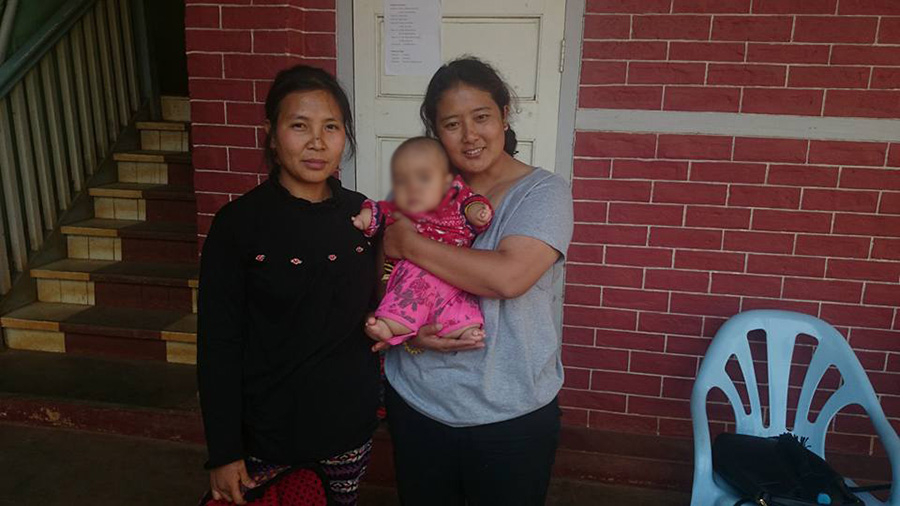At a camp for internally displaced persons (IDP) in Shan State’s Kutkai Township in 2016, humanitarian aid worker Lamai Mai Mai noticed 3-year-old Gun Mai was being teased by other children for covering his mouth all the time.
She found out that Gun Mai was born with a cleft palate.
Mai Mai felt heartbroken by what she saw and, by sharing a photo of the boy on her social media pages, she managed to find funding for his medical treatment in less than a week.
After seeing her post, other residents and aid workers of IDP camps contacted Mai Mai requesting help for children suffering from cleft palates and lips—birth defects that occur when a baby’s mouth does not form properly during pregnancy and commonly called orofacial clefts.
This was how 39-year-old Mai Mai came to work treating IDP children with these problems. In the last year, she has helped 11 children access treatment.
“They have all had their cleft lip operations, and are just waiting for their cleft palate operations,” she said.
Mai Mai is also a founder of the National Ethnic Youth Conference, which gathered 800 youth delegates from 27 ethnic tribes in Myanmar in August 2016, aiming to foster understanding and trust and build a peaceful, federal union in Myanmar.
She is also a founding member of the Kachin Youth Organization and helped organize the National Ethnic Youth Alliance meeting in July 2016. Mai Mai teaches Myanmar youth about federalism, democracy, citizenship.
On March 16, 2017, Mai Mai was recognized as a “Woman of Change” by the US Embassy to Myanmar.
A fellow organizer of the National Ethnic Youth Conference and president of the Naga Youth Council Athong Makury said Mai Mai is “ready to face challenges, she is compassionate and committed to her people.”

As a formerly displaced person who spent almost four years in Mai Jay Yang camp on the border of China in Kachin State she said, “I know how difficult IDP life is, I know the on-the-ground situation and the particular needs of IDPs.”
“Life in the IDP camp is a struggle, filled with fear and insecurity,” Mai Mai said as she reflected on the event.
Mai Mai has worked to help young Kachin people fight drug addiction and find jobs since 2002.
In late 2010, Mai Mai was working with jobless youth in Kachin Independence Army (KIA)-controlled areas. As she returned from a trip to China, she was accused of being a human trafficker by Myanmar authorities and evaded arrest by hiding in an IDP camp.
Mai Mai worked with civil society organizations to help some of the 100,000 vulnerable people displaced in northern Shan State and Kachin State in 2011 when a 17-year ceasefire between the Myanmar Army and the KIA broke down.
International and local aid groups provide the basic needs of IDPs including rice, oil, and shelter, she said, but often fail to provide adequate medical provision.
She found lots of disabled children suffering in camps in need of specialists support.
Incidences of cleft lips and palates occur in every 800 to 1,000 births, meaning an estimated 6,000 children are affected each year, according to a lecture by surgeon Dr. Thi Ha Myint Wei in January 2016.
Experts believe orofacial clefts may be caused by insufficient nutrient, drug and alcohol usage, cigarette smoking, or taking certain medication during pregnancy.
A doctor from Lashio in northern Shan State visiting an IDP camp said malnutrition and insufficient maternal health education were to blame.
Only a handful of practices in large towns and cities can perform the necessary surgical procedure to correct them, he said, adding that it’s not just the costs of surgery that leaves families out of pocket, but also traveling and daily expenses during hospital stays.
Mai Mai is currently collecting data on orofacial clefts and other disabilities affecting children in IDP camps to be passed to the Social Welfare Ministry and the local authorities, Mai Mai told The Irrawaddy.
“As far as I know, there was no a specific organization or groups supporting these issues in IDP camps and nearby villages until now,” Mai Mai said.
“I’ve decided to help as much as I can.”
She told The Irrawaddy that she can’t afford to do it alone. She is busy asking camp leaders, local communities, and authorities to help tackle the problem.
“This issue is important,” Mai Mai stated, “children are our future.”

















